Have you ever pressed on your brake pedal, expecting the normal, confidence-inducing deceleration, only to be met with a spongy pedal, warning light in your dash, or lack of stopping power? These are all key signs that your brake master cylinder may be failing you.
Ignoring these, and other symptoms of a faulty brake master cylinder places you and others at serious risk. So continue reading to help confirm the issue and get an idea of how much it’s going to cost to fix.
Importance of the Brake Master Cylinder
The brake master cylinder is the heart of the hydraulic brake system in vehicles. This important component converts the mechanical force from the brake pedal into hydraulic pressure in order to activate the brake calipers and pads.
The master cylinder contains a reservoir that stores the brake fluid. When you push your foot on the brake pedal, it activates the push rod inside the master cylinder. The push rod then forces two pistons outward, which pressurizes the brake fluid in the reservoir.
This pressurized fluid travels through the brake lines and hoses to each wheel cylinder and caliper assembly.

Inside the wheel cylinders at each wheel, the pressurized brake fluid applies equal force to both brake pads, clamping them against the rotor surface. This is what allows your vehicle to slow down and stop.
The harder you press the brake pedal, the more force is applied to the pistons in the master cylinder, and the higher the pressure sent to brake calipers to stop the wheels from spinning.
Bad Brake Master Cylinder Symptoms
Once the brake master cylinder starts to fail (or has already stopped working), you’ll likely notice one or more of the symptoms below.
1) Brake Warning Light

The first symptom that is the easiest to notice is when the Brake Warning Light illuminates on the dashboard. This indicates that there is some kind of problem with the braking system, but it might not necessarily mean that the brake master cylinder is at fault.
But if the braking system sensors detect the brake fluid pressure is dropping, it will likely be due to a bad brake master cylinder. This will result in the warning light coming on.
If the ABS light comes on, the root cause could be the brake master cylinder, especially if the master cylinder is leaking fluid.
2) Brake Fluid Leak
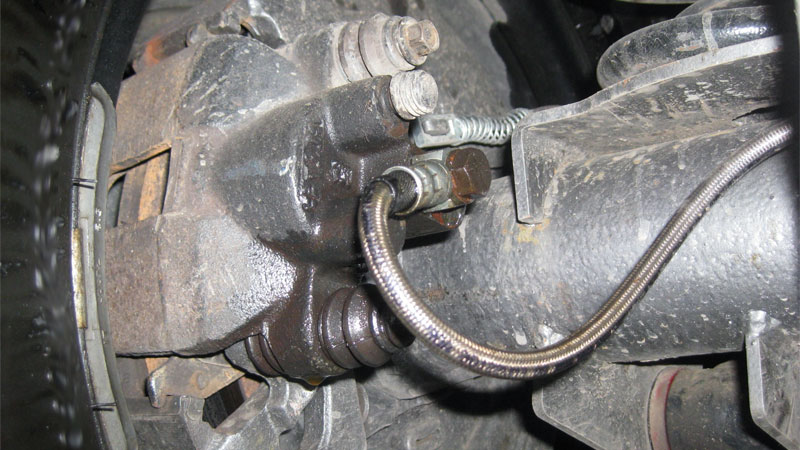
The brake master cylinder needs a certain level of brake fluid to create the hydraulic pressure necessary for slowing down the vehicle.
If the brake master cylinder is leaking braking fluid or if there are unsecured reservoirs on the cylinder which are holding the fluid, then you will almost be guaranteed of having a low brake fluid level.
This will impair your ability to slow down the vehicle. You would need to replace the brake master cylinder in this situation.
3) Spongy Brake Pedal
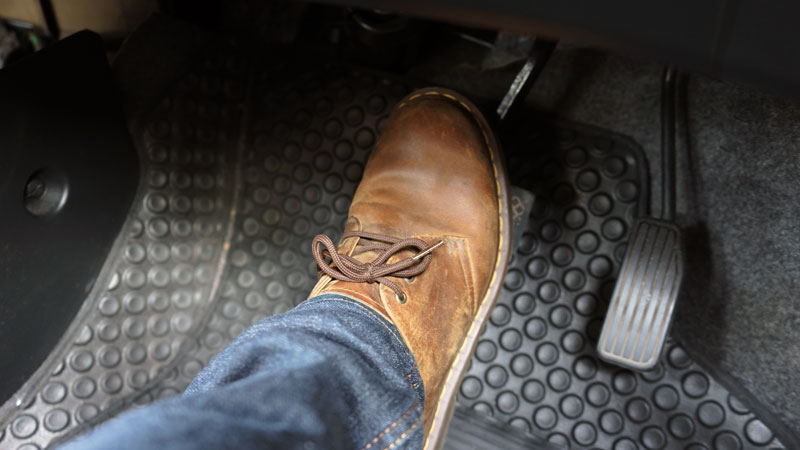
When the brake pedal starts to feel spongy as you place pressure on it with your foot, this will automatically be a sign that your brake master cylinder may be having issues.
The cylinder contains rubber seals which keep the brake fluid inside of it. If these rubber seals were to get worn out or damaged, then there’d be an internal brake fluid leak. The result of this would be a spongy feeling in the brake pedal.
4) Contaminated Brake Fluid
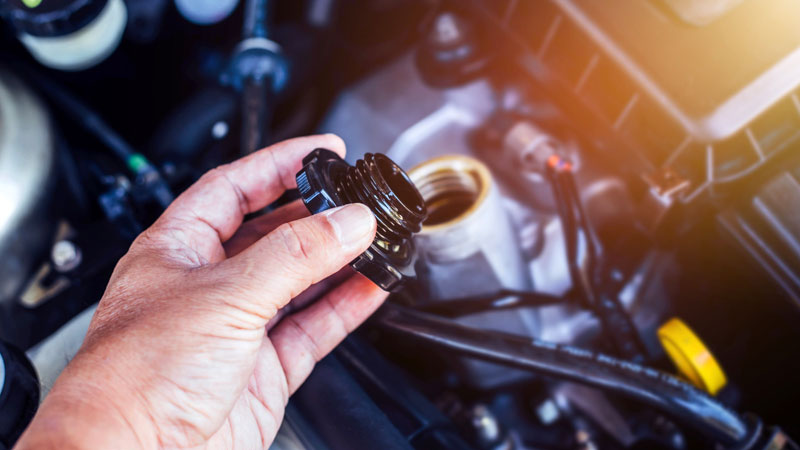
Another problem that could happen as a result of worn out rubber seals is contamination in the brake fluid. The seals not only help keep the brake fluid from coming out, they also prevent dirt and debris from mixing with the brake fluid.
If this were to happen, the brake pressure would not be as strong as you step on the brake pedal. You’d probably end up pressing down harder on the pedal just to get the vehicle to slow down like normal.
5) Sinking Brake Pedal
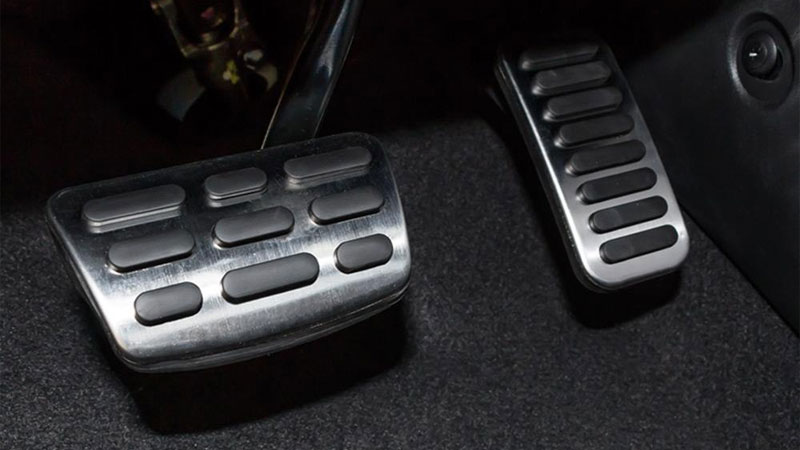
Following all these other symptoms, you will start noticing the brake pedal not returning to the top after you’ve removed your foot from it. Instead, it will slowly sink to the floor.
This could become a real driving hazard, so you’ll want to fix the brake master cylinder right away at this point.
Read also: 5 Symptoms of a Bad CV Joint and Replacement Cost
6) Bad Brake Bias
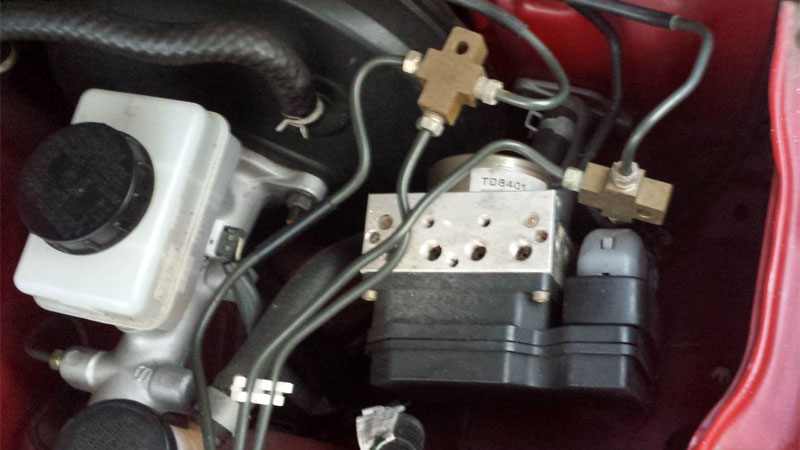
Brake master cylinders often contain two separate circuits that separate brake fluid to the wheels in pairs. This is to prevent a total loss of braking if there were to be a leak in one side of the system.
Often these circuits will control one front wheel and the opposite rear wheel. For example, the front left and rear right wheels may share a circuit, while the front right and rear left wheels share a separate circuit.
If one circuit has failed, you may notice the vehicle pull to one side under braking. This will be most apparent when you brake really hard, as the front brakes do more work to stop the vehicle than the rear brakes.
7) Uneven Brake Pad Wear
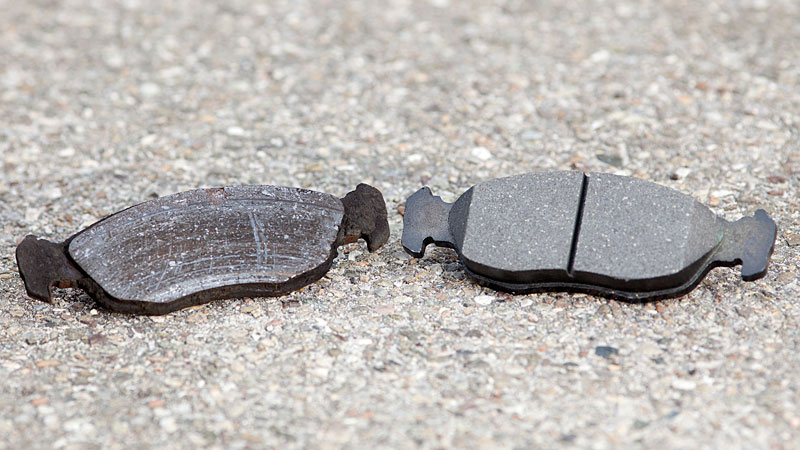
Caused by a failed circuit, if only two out of four wheels are able to apply the brakes, you will notice uneven pad wear. For instance, the front right side and the rear left side would be worn down more than the front left and rear right.
A failure of one of the piston seals in the master cylinder or a brake line leak could cause one circuit to fail. If you notice uneven braking, uneven pad wear, or your car pulls to one side when braking, your brake master cylinder could be at fault.
Brake Master Cylinder Replacement Cost
We recommend Parts Geek for the best prices and selection.
If you have a brake master cylinder that goes bad, the average cost to replace the cylinder will be between $340 and $520. The cost of the part itself will only be around $100 to $210. But the biggest expense of the replacement job will be in the labor costs, which are around $250 to $320.
If you were to be knowledgeable in vehicles and braking systems, then you would be able to save a fortune on the labor costs by doing it yourself. However, it is a job that requires you to have a good amount of automotive repair experience or else you may make things worse.
Many master cylinders can be replaced by unbolting the master cylinder from the firewall, disconnecting the brake lines, and reinstalling the new unit. The brake system needs to be bled after this procedure. Refer to a repair manual for the proper bleeding procedure.
Do note that ABS systems can be tricky to bleed. If you’re not comfortable performing this repair yourself, please bring your vehicle to a trusted mechanic.
Diagnosing a Faulty Brake Master Cylinder
If you suspect your brake master cylinder may be having issues, there are a few things you can look for and tests that can confirm whether or not it needs to be replaced.
Start by visually inspecting the master cylinder reservoir under the hood to see if the brake fluid level is low or if there are any obvious leaks around the device. Low fluid levels or leakage indicate a potential issue with the seals inside the cylinder.
Next, apply the brake pedal with some pressure and hold it down, taking note of how the pedal feels. If the pedal sinks all the way to the floor and has a spongy/soft feel, the master cylinder may be failing to build up pressure properly. Healthy master cylinders keep the pedal firm and high off the floor.
If you feel comfortable in your ability, you can also test brake system components one by one to pinpoint if the master cylinder is faulty. Use a hydraulic pressure bleeder to maintain equal pressure at each wheel.
If the calipers and wheel cylinders are working properly with this assisted pressure, it points to inner seals in the master cylinder leaking and preventing full system pressure.
While diagnosis can take some time and effort, catching issues early prevents safety hazards and more extensive brake repairs down the road. Reaching out to a professional mechanic can help accurately troubleshoot and identify if replacing the master cylinder is required.
- Power Windows Not Working? (10 Common Causes and How to Fix) - February 8, 2024
- 14 Causes of a Car Losing Power When Accelerating - January 23, 2024
- 13 Causes of Poor Gas Mileage (Increase Your MPG) - December 13, 2023

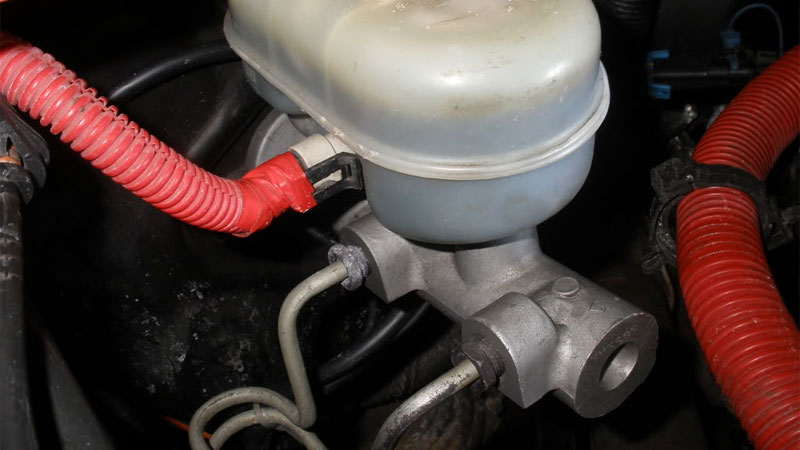
2009 Yukon.
Changed the break pads and went to bleed the breaks, but the break pedal won’t push down (doesn’t drop to the floor like normal when pumping). Never experienced this before, what could be the problem?
ABS light is not on.
Sounds like there might be an obstruction somewhere. Did you try cracking loose all bleeder screws?
Car will occasionally stall under moderate to heavy breaking or at least bog down or studder. Now car loses brake pressure when stopped and it takes more and more pedal to keep stopped until your at the floor. Brake fluid is leaking or disappearing but have no idea where it’s going. 1996 Honda Accord.
YES i did bleed the system then i got brake then after driving the pedal quietly go down again
What should i do to rectify this situation?
I have a truck and the braking system not holding despite the many attempts to bleed brake lines and change of master cylinder
When you say it’s “not holding”, do you mean you’re losing brake fluid or have no brake pressure?
i have 2009 ford foucs an i have changed the brake booster an the re build the calibers when i get into the car the brakes feel good but as soon as i turn on the car the brakes go to the floor does this mean i have a bad master cylinder.
Sounds like you have no brake pressure. Have you bled the new brakes? Check to make sure you have no air in the system.
I get an occasional sponginess and a droning noise under the hood in 2006 Toyota Corolla that happens only after about an hour or 2 of driving. It gets pretty loud and I can feel the gas pedal vibrating underfoot but it all goes quiet when brake/clutch applied, then starts up again when I let the brakes go.
I checked and saw the brake fluid was a tad low, filled it up sponginess stopped, but still worried it might be transmission? I have new brake pads. No abs lights.
I’m not really sure. I think you will have to run that by a local technician.
I have Toyota nova van I have fixed new master cylinder , change abs module second hand my front wheel getting to hot also I have clean the clipper done lubricant all wheels and greasing still same sponge break , let me get digoneses what is cause , I want your advice , what can be problem
I’m not sure I understand the problem. Do you suspect the new master cylinder is bad?
Can a bad master cylinder cause the hydraulic to go bad?
My son has a 2008 Jeep Wrangler and this morning his breaks went to the floor. He removed the Master Cylinder Cap and the rubber gasket just popped out. He went to put it back in the cap and when he did, he split it down the middle. Brake fluid was still full. I bought a new cap w gasket. Wondering if the gasket may have been so worn and not sealing that it would cause his breaks to go to the floor???? Is this possible?
That’s probably not the issue, if it’s just the seal on top of the reservoir cap you’re referring to. I would have the braking system inspected so you know for sure that it’s safe.
I have same problem as don I need to know what causes this
Hi I have brake fluid leaking onto my driveway from where the brake fluid goes. I have a 2006 Jeep wrangler. After reading your articles it sounds like the master cylinder? I don’t know… Thank you.
It could be the master cylinder, but it may just be a leaky brake line where the line connects to the master cylinder. Have you tried tightening the lines?
My car Is binding so I don’t know if the problem my might be a braking master cylinder or what.pls help
Can you describe “binding” in a bit more detail?
I have a 1998 CRV Honda, recently when i drive for more than 15 minutes, the car just stalls, it starts to go slowly about 20miles/hour despite stepping on the fuel pedal. Also the front tyres are super hot to touch and they smell. Could it be a master cylinder issue?
I’m not sure. Can you tell if that heat is coming from the engine or the brakes?
I have a 2008 Lexus ES350, ASB light came on. After I pump the brake pedal, I get good brake pressure. Mechanic checked stated “no problems with the brakes, rather air pressure. Any advise would be greatly appreciated. Thanks.
I have a 2010 Lincoln MKX already spent 800. On new brake pads new front calipers brakes are spongy now yet another car place the last two lace thinks it’s a master cylinder how much will that cost and will it solve problem
You could always ask the shop for a quote, but it shouldn’t cost too much. It’s hard to know if it will solve the problem without having looked at the vehicle.
I have a 1985 Jeep CJ7 with power brakes. I have bled the brakes, and checked the Booster Check valve for proper function. There are no visible leaks. When I press the pedal firmly, the vehicle stops fine (most of the time), but when pressing the brake pedal slowly, it goes all the way to the floor. Not sure if this is a Master Cylinder issue or the Brake Booster. Any thoughts?
Hi. Recently I was driving in the snow in my 2004 GMC Sierra and tried to come to a stop. The brake pedal went fight to the floor and felt like the brake line was broken. I pumped the brake and it continue to go down to the floor with no or very little stopping action. I shut my truck off and continue to pump the brakes and eventually it’s back to normal. No sign of any brake fluid leakage. The brake fluid level is also normal. No ABS light came on during this also. Any ideas if a master cylinder is to blame? Again, everything seems normal again and this has never happened before. The truck has 195,000 miles. Thank you.
I’m not sure. I think it would be best to have a mechanic take a look at your braking system.
I replaced my master brake, the ABS stopped bringing fluid to two legs so it was condemned and used 3 junction pipes to work it, and now only one front left and rear right is working, what could be the problem
When I hit my breaks all I here is a lot of air and it’s hard to stop what could that mean
Check your brake fluid level. I would also bleed the brakes to make sure you don’t have any air in the lines.
I have this same issue. Done the suggestions you made and still hear air and hard braking?
I’d take it to a shop to have the problem diagnosed. They will have a much better idea of what the problem is if they can hear what you’re hearing.
My brakes is sponge change back brake pads. But didn’t bleed it would that b tha problem & brake light is still on.
Check your brake fluid, make sure it’s topped off. If the brakes feel spongy it wouldn’t hurt to try bleeding them. If your brakes are still spongy after bleeding or you’re not comfortable bleeding them yourself, have a mechanic take a look at it.
I’d like to link your page http://oards.com/brake-master-cylinder-symptoms-and-cost/
to a lesson plan to be distributed statewide in Tennessee for the high school Auto classes to use in the online classes.
Is that OK?
I am the statewide program manager.
Thanks
Sure, you’re more than welcome to link to our site. We’re honored to be part of your curriculum!
Could be the booster- brake assisting is solely to reduce pedal effort. This is accomplished by the booster. The diaphragm in the booster may have failed-causing a hard brake pedal
My Lexus RX300 breaks gets hard when applying breaks, so I will have to use more force to press it down in other to stop the car. I checked and didn’t see any linkage on the master cylinder. What could be the cause of it
Got cylinder change on a Honda but ofter a hour drive the wheel stop moving hey look up what to know why
I noticed my brakes getting spongy and it took more pressure to stop. Now my brakes go to the floor but the car will stop. It has no fluid loss. I scanned for codes b1342. How do I know whether to replace the ABS module or the master cylinder?
You may have air in the ABS lines. ABS lines are particularly tricky to bleed, so I would take it to a shop to make sure it’s done right.
In some ABS systems you can bleed the ABS unit by taking the small rubber cap off the ABS unit and pushing the stainless ball bleeder in with a punch tool or small screwdriver. A helper needs to pump the brakes and hold like with normal brake bleeding. With the helper holding, push in the ABS bleeder ball until straight fluid comes out and let go of the ball. Then put the rubber cap back on to keep debris out. In an emergency, if the ABS unit itself malfunctions or is otherwise faulty (causing brake & pedal stutter etc) (and no other leaks are present) you can always take the ABS fuse out to operate the brakes without ABS. It’s also a way to test and see if the ABS is causing the problem. If brakes work with fuse out it’s likely a faulty ABS unit.
I’m having brake issues with my hummer h2 I can turn the car on and drive for like 10 minutes and the brakes slowly start locking in till. there completely locked I have to wait like 3 hours for the brakes to completely release and drive again. And it got sign of leaking brake fluid right by the master cylinder
I would start by rebuilding or replacing the master cylinder since you know it is leaking. Bleed the brakes and see if the problem persists. If you can determine that only one corner is grabbing, you likely have a seized caliper that will also need a rebuild or replacement.
Sounds like the master cylinder is bad. Same thing happened in my truck. The brakes would lock up and not release until it was done manually. Replaced the master cylinder with a good used one. Then the brakes worked right.
I have a 2004 Ford E350 van and had a similar problem Rudolph. I also had the master cylinder replaced and still the problem remained. I found on some forums that it could be the ABS pump assembly. I replaced mine and problem solved. Maybe your type of vehicle has something similar.
I have replaced 2 master cylinders, and my brakes sink, and I have to press to the floor, and nobody can fix my problem.
You may have a brake fluid leak, or air in the lines. It’s possible one of the brake line connections has come loose. If you have ABS, it may not have been bled properly as these systems can be tricky to bleed yourself.
I would be better to find someone who work on cars then to take to a pkace, I can’t afford all the labor costs
I have an 89 s10 with manual brakes. My brakes locked up completely at all 4 wheels. I loosened the brake lines at the master cylinder to relieve the pressure and the brakes loosened right up. Tightened the lines, pressed pedal a couple of times and they’re locked up again. What’s happening?
Valve in the master cylinder is probably plugged/seized.
If your vehicle has ABS, it may be the hydraulic control unit. a valve in the unit is stuck open. Only to fix it is to replace it.
Master may not be the issue. One thing that comes to mind is not bleeding the brakes properly (per manufacturers specs) and bleeding furthest wheel from the master first and closest wheel to the master last. Outside of the braking system, if you have a hydraulic system that uses the hydraulic pressure from the power steering for a dual purpose, you may have a leaking steering pump or component or if all if leak free, may need to “burp” or bleed the power steering system. This is usually at issue after changing a steering gear box and with non-power boost brake systems.
Is the adjustment ok, meaning Pedle adjustment. Is it the same size? Has there been any modification to the disc of wheel cylinders? Has it got a leak somewhere? If the above are adhere to then all should work. But sounds like a volume issue.
The master cylinder has been changed and so has the brake booster. I’ve had the 2011 Ford Edge Limited at the Ford dealer three times already and still have the exact same problem I’ve had for two months. Taking it back tomorrow. Already spent $900.00 for them to change brake booster and master cylinder. There are no leaks because there’s nothing showing up on my garage floor. They keep it from a day and a half to two days each time. Dealer is 22 miles away. Getting tired of taking it back, just want it fixed.
You sure your caliper piston seals are not leaking fluid/air??…or if your brake lines are still holding air??